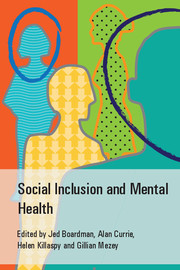Book contents
- Frontmatter
- Contents
- List of contributors
- List of tables, boxes and figures
- Foreword
- Preface
- Acknowledgements
- Scoping Group on Social Inclusion, Royal College of Psychiatrists
- Part 1 What is social exclusion?
- Part 2 Social exclusion: the scope of the problem
- 7 The extent of disadvantage, poverty and social exclusion in the UK
- 8 How are people with mental health problems excluded?
- 9 Social exclusion in specific social groups and individuals with mental health problems
- 10 Social exclusion and people with mental health problems: developing a clearer picture
- 11 Finding acceptance: the experiences of people who use mental health services
- 12 Social inclusion from the carer's perspective
- Part 3 Working towards inclusive psychiatry
- Index
7 - The extent of disadvantage, poverty and social exclusion in the UK
from Part 2 - Social exclusion: the scope of the problem
Published online by Cambridge University Press: 01 January 2018
- Frontmatter
- Contents
- List of contributors
- List of tables, boxes and figures
- Foreword
- Preface
- Acknowledgements
- Scoping Group on Social Inclusion, Royal College of Psychiatrists
- Part 1 What is social exclusion?
- Part 2 Social exclusion: the scope of the problem
- 7 The extent of disadvantage, poverty and social exclusion in the UK
- 8 How are people with mental health problems excluded?
- 9 Social exclusion in specific social groups and individuals with mental health problems
- 10 Social exclusion and people with mental health problems: developing a clearer picture
- 11 Finding acceptance: the experiences of people who use mental health services
- 12 Social inclusion from the carer's perspective
- Part 3 Working towards inclusive psychiatry
- Index
Summary
Poverty and disadvantage matter as they are costly to individuals, communities, society and the economy. Importantly, their effects can be passed across generations, producing a future stream of disadvantaged individuals. The areas of peoples’ lives that are affected include those of prime importance to health and social services: physical and mental health, well-being, education, employment, antisocial and self-destructive behaviour, material hardship, abusive family and personal relationships, social isolation, stigma, lack of control, shame and low self-esteem. Poverty and disadvantage result in poor health, just as poor health can result in poverty and disadvantage. Conditions of poverty and disadvantage also provide the context in which mental health services operate and can limit the success of health and social interventions. In this chapter we will begin to paint a picture of disadvantage, poverty, and social exclusion in the UK at the beginning of the 21st century, before going on in the subsequent chapters to examine how people with mental health problems and learning disabilities sketch on to this canvas. We will examine some of the objective measures of exclusion and the extent to which the population of the UK is disadvantaged as well as the changes that have occurred over the past 20 or more years. Levels of disadvantage in Black and minority ethnic groups are highlighted.
The extent of disadvantage, poverty and social exclusion in the UK
Recent changes in the UK
During the 20th century there were huge changes in the quality of life for most people in the UK and we now experience better standards of living, health, education and housing than we did in 1900. Although the great giants of ‘Disease, Ignorance, Squalor, and Idleness’ described by Beveridge (Timmins, 1995: p. 23) have been reduced in the UK, they are still highly relevant for a proportion of the population. The patterns of poverty, disadvantage and equality changed drastically in the 1980s, producing levels of poverty and inequality unprecedented in the post-war years (Stewart et al, 2009).
- Type
- Chapter
- Information
- Social Inclusion and Mental Health , pp. 101 - 134Publisher: Royal College of PsychiatristsPrint publication year: 2010



